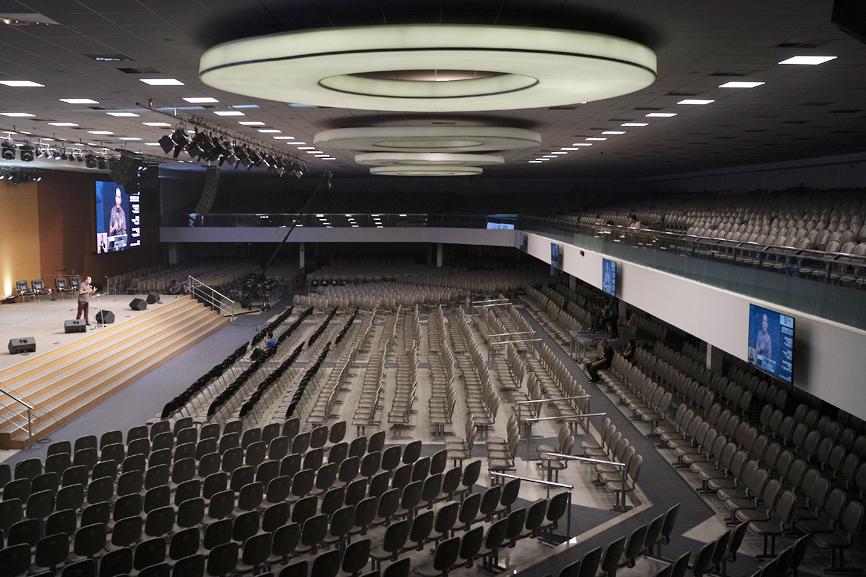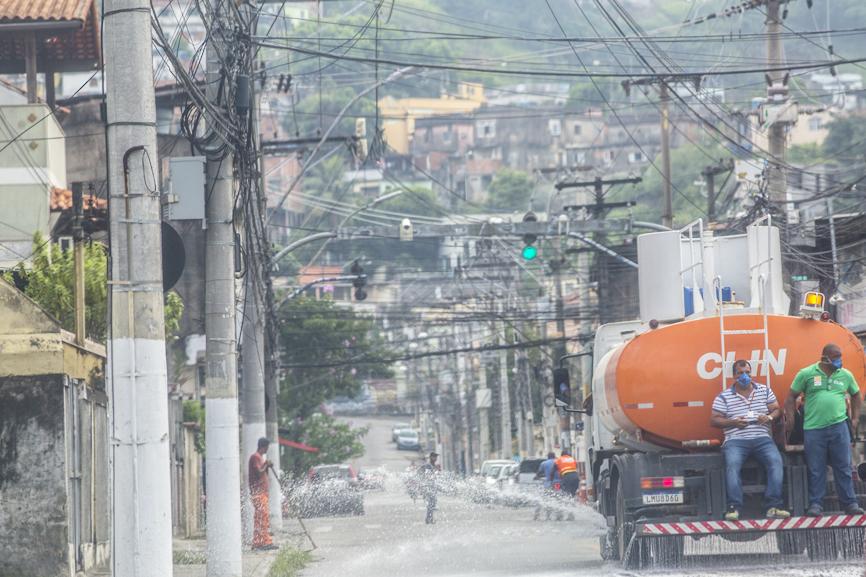Like every Sunday, Brazilian Pastor Silas Malafaia took the stage of his Pentecostal temple in a middle-class Rio de Janeiro neighborhood.
However, this week, he wore a T-shirt instead of a blazer and, behind the three cameras broadcasting to his legion of YouTube followers, were thousands of empty seats.
Brazil’s churches have landed on the front lines of a battle between state governors, who have introduced quarantine measures designed to contain the spread of the new coronavirus, and Brazilian President Jair Bolsonaro, who is actively undermining them and says a broad lockdown will ultimately destroy the nation’s economy.

Photo: AP
Brazil’s politically powerful evangelicals helped bring the far-right president to power in the 2018 election and Bolsonaro is letting them know they are not forgotten, political analysts said.
The most influential pastors are backing the president’s radical coronavirus stance while begrudgingly respecting governors’ orders, and either canceling services or moving them online. There are signs some churches are disobeying.
“I’m asking, which is worse: coronavirus or social chaos?” said Malafaia, one of Brazil’s most prominent pastors, who leads the Assembly of God Victory in Christ Church. “I can guarantee you that social convulsion is worse.”

Photo: Bloomberg
It mirrors the argument of Bolsonaro, who has urged governors to abandon lockdown and likened COVID-19 to a “little flu” that mainly threatens the elderly and those with pre-existing health problems.
On Sunday, he hit the streets wearing no gloves or mask and joined multiple gatherings, in defiance of recommendations from his own Ministry of Health.
Bolsonaro, a conservative Catholic who married an evangelical in a service Malafaia administered, has zeroed in on the need to reopen the churches.
“God is Brazilian,” he told people on Sunday, O Globo reported.
Some religious organizations, such as the National Conference of Brazilian Bishops, have welcomed measures in Rio and Sao Paulo, where all non-essential businesses shut down.
Pope Francis warned in a letter, parts of which were published on Monday, of “viral genocide” if countries that prioritize economies over people.
In contrast, Malafaia and other evangelical leaders across Brazil have voiced outrage at governors’ decisions, warning they would only cooperate under court order.
“The media say thousands and thousands of people are going to die,” Malafaia said in the interview. “All these catastrophic predictions, I want to reject them.”
Malafaia said European-style measures cannot be replicated in Brazil, where millions survive in the informal sector and a day without work can mean a day without food.
On social media, some pastors downplayed health risks posed by COVID-19, claiming one cannot catch the virus inside a house of God, but could be infected at home if failing to attend services.
From March 16 to Wednesday last week, Rio state prosecutors received dozens of complaints from citizens who said they had seen churches welcome parishioners even after the state imposed quarantine measures.
They are looking into the complaints and could file civil suits.
“My mother is 74 and has hypertension and goes almost every day to the church that encourages even at-risk people,” read one of the complaints reviewed by reporters.
The virus is real indeed, and not sparing religious communities.
In France, local media reported a large evangelical gathering in Mulhouse transformed the surrounding area into the country’s largest concentration of cases.
In Washington state, a Presbyterian choir rehearsal attended by 60 people, all seemingly without symptoms, apparently produced 45 infections and two deaths, the Los Angeles Times reported on Sunday.
Brazil had 4,661 confirmed cases and 165 deaths as of yesterday.
On Thursday, Bolsonaro passed a decree that added religious activities to the list of “essential services,” even though citizens were asked to stay home.
However, the decree was overruled by a federal court on Friday.
On the streets on Sunday, he again defended people getting back to work.
“Open the churches, please, we need them,” one woman begged repeatedly in one of the videos he posted to social media. He replied with reassuring words.
Analysts say Bolsonaro is addressing his electoral base. Brazil is home to the world’s largest number of Catholics — about 123 million, according to the 2010 census, but evangelicals are a growing force, with 42 million believers, about 20 percent of the total population.
“No political party in Brazil manages to bring together as many people, in as many places, as many times a week as churches do,” said Carlos Melo, a political science professor at Insper University in Sao Paulo. “And people tend to follow the pastors’ directions.”
Pastors “say that coronavirus is just a test sent by Satan and that we all just need to gather together and pray and we’ll be able to repel it,” said Andrew Chesnut, a professor of religious studies at Virginia Commonwealth University. “It’s specifically evangelicals that are anti-science and it’s the same thing in the US. They always have been. It goes back to having a literal, fundamentalistic interpretation of the Bible.”

Kehinde Sanni spends his days smoothing out dents and repainting scratched bumpers in a modest autobody shop in Lagos. He has never left Nigeria, yet he speaks glowingly of Burkina Faso military leader Ibrahim Traore. “Nigeria needs someone like Ibrahim Traore of Burkina Faso. He is doing well for his country,” Sanni said. His admiration is shaped by a steady stream of viral videos, memes and social media posts — many misleading or outright false — portraying Traore as a fearless reformer who defied Western powers and reclaimed his country’s dignity. The Burkinabe strongman swept into power following a coup in September 2022

‘FRAGMENTING’: British politics have for a long time been dominated by the Labor Party and the Tories, but polls suggest that Reform now poses a significant challenge Hard-right upstarts Reform UK snatched a parliamentary seat from British Prime Minister Keir Starmer’s Labor Party yesterday in local elections that dealt a blow to the UK’s two establishment parties. Reform, led by anti-immigrant firebrand Nigel Farage, won the by-election in Runcorn and Helsby in northwest England by just six votes, as it picked up gains in other localities, including one mayoralty. The group’s strong showing continues momentum it built up at last year’s general election and appears to confirm a trend that the UK is entering an era of multi-party politics. “For the movement, for the party it’s a very, very big

ENTERTAINMENT: Rio officials have a history of organizing massive concerts on Copacabana Beach, with Madonna’s show drawing about 1.6 million fans last year Lady Gaga on Saturday night gave a free concert in front of 2 million fans who poured onto Copacabana Beach in Rio de Janeiro for the biggest show of her career. “Tonight, we’re making history... Thank you for making history with me,” Lady Gaga told a screaming crowd. The Mother Monster, as she is known, started the show at about 10:10pm local time with her 2011 song Bloody Mary. Cries of joy rose from the tightly packed fans who sang and danced shoulder-to-shoulder on the vast stretch of sand. Concert organizers said 2.1 million people attended the show. Lady Gaga

SUPPORT: The Australian prime minister promised to back Kyiv against Russia’s invasion, saying: ‘That’s my government’s position. It was yesterday. It still is’ Left-leaning Australian Prime Minister Anthony Albanese yesterday basked in his landslide election win, promising a “disciplined, orderly” government to confront cost-of-living pain and tariff turmoil. People clapped as the 62-year-old and his fiancee, Jodie Haydon, who visited his old inner Sydney haunt, Cafe Italia, surrounded by a crowd of jostling photographers and journalists. Albanese’s Labor Party is on course to win at least 83 seats in the 150-member parliament, partial results showed. Opposition leader Peter Dutton’s conservative Liberal-National coalition had just 38 seats, and other parties 12. Another 17 seats were still in doubt. “We will be a disciplined, orderly